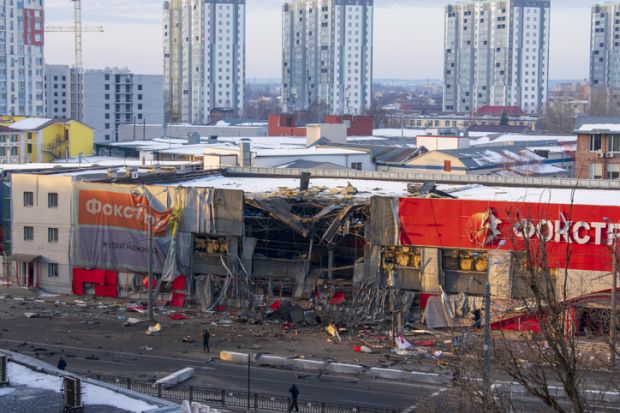Actions against universities in Russia should focus on ways that encourage staff to meet their “political responsibility” and speak out over the war in Ukraine, according to a sociologist in the country.
Greg Yudin, a professor at the Moscow School of Social and Economic Sciences, also urged the international higher education community to keep actions as focused as possible on those public universities that were aligned with the Kremlin.
Referring to a letter published earlier in the month by the Russian Union of Rectors backing the government, he said that any decision by universities abroad to cut ties with institutions signing the letter would be “totally legitimate”.
“They have decided now that they are part of the state that is [carrying out] an aggressive war against its neighbour,” Professor Yudin said.
However, he urged caution against expanding such action to those independent non-state institutions that “have never signed anything supporting the war” and may “tolerate, accept and maybe encourage” staff and students taking an anti-war stance.
He also said that it might be unfair for researchers who worked independently and were not part of state universities to be caught up in any bans on cross-border cooperation.
“The rectors [at public universities] are installed by the state and they are part of the state and targeting them is very natural,” he said.
“And people who are working for these institutions in their roles as employees of these institutions, that’s fine, but…the whole idea of holding a Russian passport [being] grounds for [action] is not clear to me.”
Professor Yudin, who himself was taken to hospital after being injured in an anti-war protest on the first day of the invasion, said he personally accepted that academics at state universities might have to suffer for the greater good by losing international ties.
“Compared with what is happening in Ukraine I don’t think we are really entitled to protest about that. I fully accept those actions and I support them even though I suffer from them personally,” he said.
“The challenge that the world is currently facing is incredible. The world hasn’t faced a challenge like that in many, many years and possibly even never in human history,” said Professor Yudin, who wrote presciently about the risks of a war in Ukraine two days before the invasion.
“So it has to be stopped now at any cost. Right now. If it is not stopped in Ukraine it will turn into a global catastrophe. Studied from that premise, then if we [academics] are collateral damage then it has to happen and let it be.”
However, he also warned that there were already signs of a crackdown on staff “making political statements” about the war, with tensions between those running universities and their academics and students, that had already simmered for years, now coming to the boil.
“The risks of losing a job or losing a scholarship are very real,” he said, adding he was aware of some names being removed from an open letter signed by thousands of academics protesting the war “obviously because of being under pressure” from the authorities.
But he still said that staying silent reflected “a deep lack of political responsibility” and urged measures that were taken in Europe and elsewhere to end collaboration “to be accompanied by a specific plea to speak up”.
“Even if they are against the war, if they stay silent there is something profoundly wrong with their position and this, I think, is a message that deserves to be made.”
Professor Yudin also confirmed that many academics, and others that were opposed to the war, were simply leaving Russia while they could.
“People are fleeing. There is an exodus from Russia. A significant portion of academic people [are leaving] because they understand what is at stake.”
Register to continue
Why register?
- Registration is free and only takes a moment
- Once registered, you can read 3 articles a month
- Sign up for our newsletter
Subscribe
Or subscribe for unlimited access to:
- Unlimited access to news, views, insights & reviews
- Digital editions
- Digital access to THE’s university and college rankings analysis
Already registered or a current subscriber? Login








